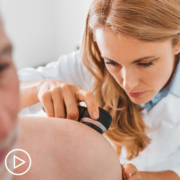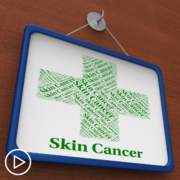Occupational Exposures and Non-Melanoma Skin Cancer: Understanding Risk Factors
Occupational Exposures and Non-Melanoma Skin Cancer: Understanding Risk Factors from Patient Empowerment Network on Vimeo.
Which non-melanoma skin cancer causes and risks are important to know? Expert Dr. Silvina Pugliese explains common risk factors and advice for patients who may need skin cancer checks.
Silvina Pugliese, M.D., is a Clinical Assistant Professor of Dermatology and Attending Physician at the Stanford Medicine Outpatient Center and Stanford Cancer Institute. Learn more about Dr. Pugliese.
[ACT]IVATION TIP
“…if you are within one of these occupational categories where you work primarily outdoors or have worked primarily outdoors, have had sunburns while working outdoors, have worked at high altitude, it’s important to have your skin checked, to make sure that you have not developed any spots that could be worrisome for non-melanoma skin cancer.”
Download Guide | Download Guide en español
See More from [ACT]IVATED Non-Melanoma Skin Cancer
Related Resources:

|

How Do Non-Melanoma Skin Cancers Impact Non-White Populations? |

|
Transcript:
Mary Leer:
Dr. Pugliese, we always think about the sun being the main cause of skin cancers. Can you speak to the occupational exposures and the risk for non-melanoma skin cancer?
Dr. Silvina Pugliese:
Yes, absolutely. So, certainly we know that UV exposure is a huge risk factor for skin cancer. Exposure to UV or ultraviolet radiation leads to damage with…damage to DNA within the skin cells. And this damage can lead to different changes within the skin cells and ultimately to mutations that lead to uncontrolled growth, which causes a tumor or skin cancer to develop. So in addition to the role of UV, we know that there are certain occupational exposures. So closely tied to the role of UV is any job or occupation that takes place outdoors in the sun.
So, for example, any kind of farm work, farmers, migrant farm workers, construction personnel who are working outdoors, postal workers, lifeguards. The other important category of patients are our military personnel and veterans who are often in areas that are close to the equator, where their jobs involve outdoor work where there really isn’t the time and leisure to be applying sunscreen when there are other safety concerns.
When we think about the Air Force, we know there’s also a lot of UV exposure in that particular branch of the military, given high altitude with flying. And then we have a very important veteran population that we take care of in dermatology and many of those patients are in the risk factor demographic that we worry about with skin cancer, including patients who are of older age, who are white and who are male, which are all risk factors for developing non-melanoma skin cancers.
My activation tip for this question is that if you are within one of these occupational categories where you work primarily outdoors or have worked primarily outdoors, have had sunburns while working outdoors, have worked at high altitude, it’s important to have your skin checked, to make sure that you have not developed any spots that could be worrisome for non-melanoma skin cancer.
Share Your Feedback:
Create your own user feedback survey



